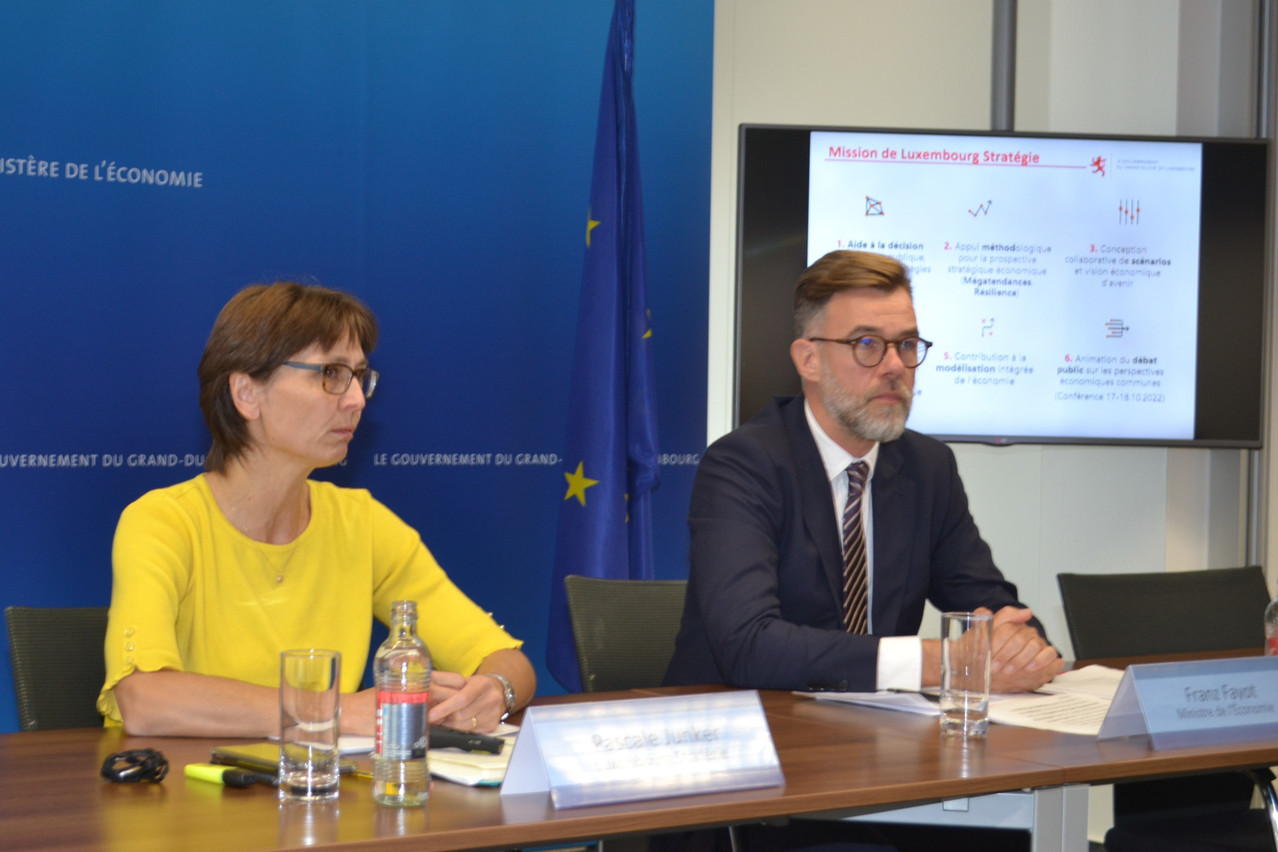"The iterative nature of the scenario-building process is only halfway through and we will continue it until next March. But it already allows us to see the three scenarios that emerge from our different working groups", explained Pascale Junker, head of Luxembourg Stratégie, at a press conference held on Tuesday 18 October at the Belval Learning Centre, alongside the Minister for the Economy (LSAP).
In concrete terms, Luxembourg Stratégie relied on several working groups--notably made up of researchers and company managers--to arrive at these scenarios. Since August 2022, the strategic foresight department of the Ministry of the Economy has also launched two studies. One, "Soc2050", is conducted in collaboration with Liser and focuses on the desirability of societal change. The other, "Risk2050", is the result of a collaboration with the University of Luxembourg and focuses on the vulnerability of the Luxembourg economy to the most relevant physical risks (climate change, decline in biodiversity, scarcity of resources, etc.).
A budget of €320,000 for this year
Last June, Luxembourg Stratégie launched a vast cycle of collaborative work to develop scenarios of possible futures for the Luxembourg economy by 2050. The budget allocated by the ministry to Luxembourg Stratégie "was €320,000 for this year, but this is mainly due to the two multidisciplinary studies that we carried out, which mobilised around ten researchers from the Uni and the Liser", explains Pascale Junker.
"This is an extension of the Rifkin strategic study, and the idea is to carry out foresight studies for a competitive, inclusive and resilient Luxembourg economy", adds Franz Fayot. The technical working group "scenarios of the 2050 economy" is currently in the third stage of six meetings and has 70 members, including the professional chambers and federations, Fedil, Syvicol, the trade unions, etc. In the course of the work, some twenty forward-looking entities from Luxembourg and the Greater Region were also consulted last August/September.
For the time being, three scenarios have emerged: the "status quo" scenario, the "bioregional circularity" scenario, and the "techno-digital liberalism" scenario. The first is the continuity scenario: it is 2050, Luxembourg has 1.1m inhabitants, the country is attracting more and more employees, with all the consequences of increased traffic and increased pressure on housing. "Carbon, material and ecological footprints are increasing, governance is short term and Luxembourg has kept its tripartite model", explains Pascale Junker.
Carbon, material and ecological footprints are increasing, governance is short term and Luxembourg has kept its tripartite model.
Workshops until next March
In the second scenario, that of social and environmental responsibility, Luxembourg has "only” 770,000 inhabitants. "The population and the economy stop growing, which eases traffic and pressure on housing, health and education systems, the environment and water." Wage, pension and social security levels stagnate, and the country makes extensive use of participatory democracy within a tightened European Union, a world leader in energy transition.
Finally, the third scenario, known as "techno-optimistic", assumes a population of 1.2m in 2050. "The housing and employment markets are very precarious, the education system is completely digitalised. Continued quantitative national growth (GDP of more or less 4.5% per year) allows for a relative balance in pension and social security funds, but also fuels unbridled global competition for access to resources", comments Pascale Junker. Globalisation is, moreover, total, and warming exceeds the +2°C recommended by the Paris Agreement.
The scenarios under construction take into account different bifurcations whose evolution is particularly uncertain in the long term, such as new forms of governance, future "eco-economic" models or the feasibility of technological and digital acceleration.
"At this stage, the scenarios under construction take into account different bifurcations whose evolution is particularly uncertain in the long term, such as new forms of governance, future “eco-economic” models or the feasibility of technological and digital acceleration", adds Franz Fayot. During the next workshops, which will continue until next March, these scenarios will be completed by factors that are still missing and certain sub-trends, whose impact on the future of Luxembourg is relatively predictable. Examples include the ageing of the population, digitalisation, the influence of social networks or the scarcity of resources. A public consultation with municipalities, citizens and companies is also planned between December and February.
This story was first published in French on Paperjam. It has been translated and edited for Delano.

